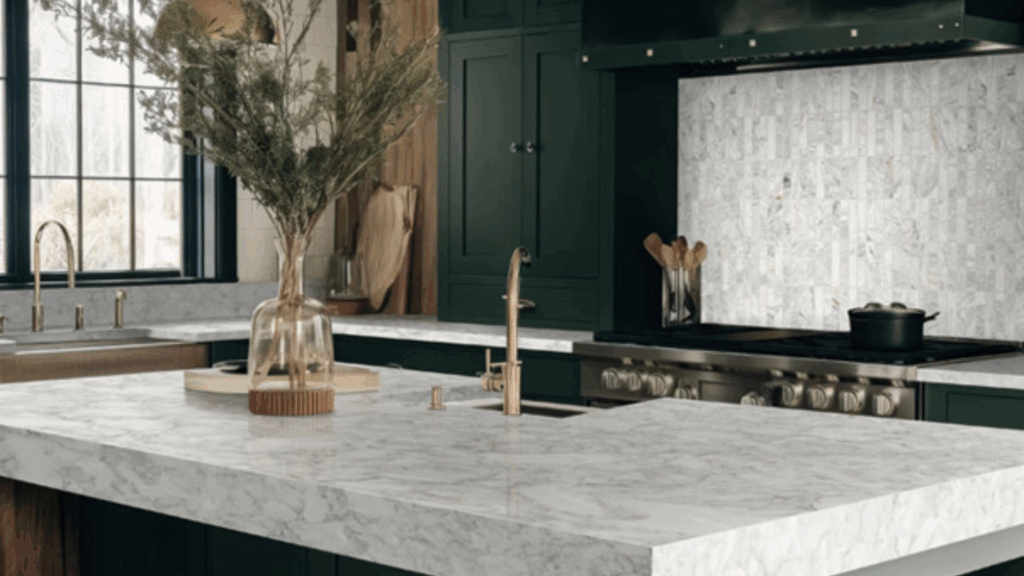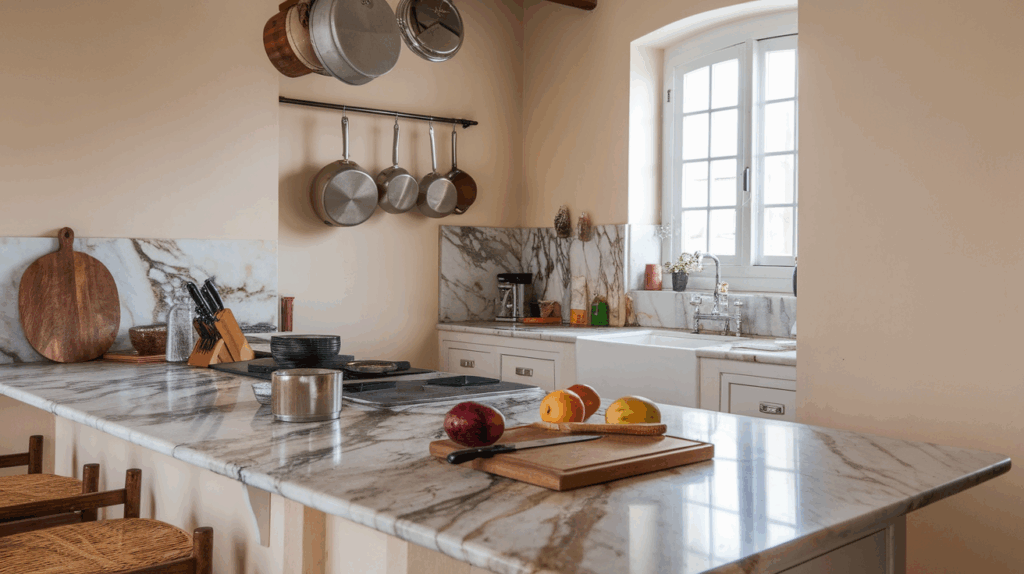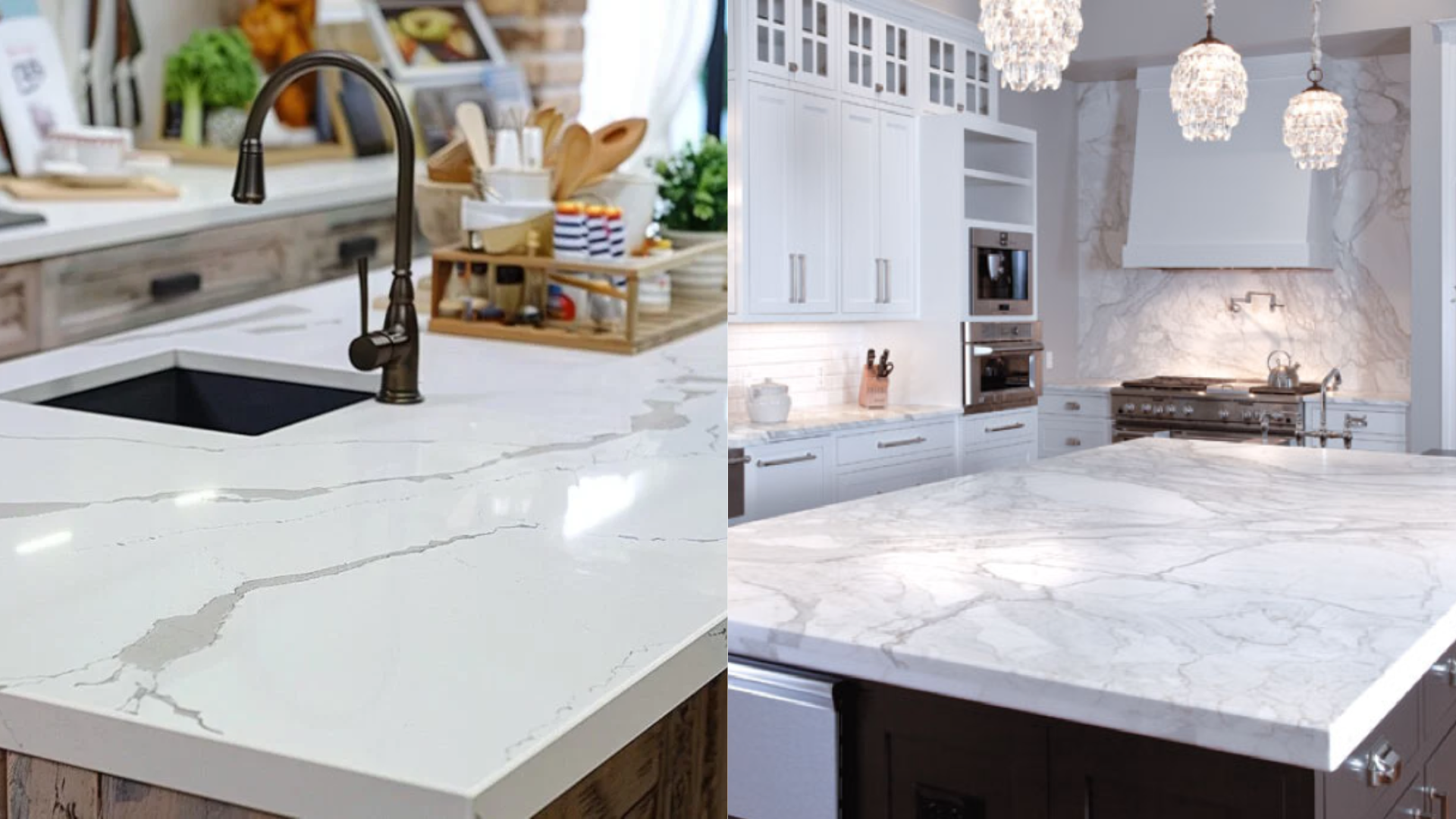Choosing a kitchen countertop can feel like a maze of options. You want something that looks great, lasts long, and fits your budget.
And the good news is that my guide will help you make the best choice between quartz and marble. I’ve done the homework, so you don’t have to.
By the end of this blog, you’ll know:
- Key differences between quartz and marble
- Which countertop works best for your lifestyle
I’ve researched expert opinions, practical experiences, and real-world performance to give you clear, honest advice.
Even if you’re renovating your kitchen or building a new home, I’ll break down everything you need to know to make a smart decision. Ready to find your perfect countertop?
Let’s get started!
What Is Quartz?

Quartz countertops are made from engineered stone, combining natural quartz crystals with resins, polymers, and other materials. This mixture is poured into molds, compressed, and hardened into solid slabs.
The result is a highly durable, non-porous surface that resists stains, scratches, and damage. Quartz countertops offer versatility in design while maintaining a consistent, uniform appearance.
Unlike natural stone, quartz is man-made, allowing for greater control over the material’s look and durability.
The engineered nature of quartz makes it more resistant to cracking and chipping than natural stones like marble or granite.
Additionally, its non-porous surface reduces the risk of staining and bacterial buildup, making quartz an ideal choice for high-traffic areas like kitchens and bathrooms.
With its low-maintenance and hygienic properties, quartz is a practical and stylish option for any home.
Benefits of Quartz Countertops
Quartz countertops are a popular choice for good reason; they offer a smart mix of style, durability, and convenience. Let’s see what makes them stand out:
- Durability: Quartz countertops are incredibly durable. The combination of natural quartz with resins makes them resistant to scratches, chips, and stains.
- Non-Porous Surface: Quartz is non-porous, which means it won’t absorb liquids, preventing stains and bacterial growth. This makes it more hygienic and easier to maintain than natural stones.
- Low Maintenance: Unlike marble, quartz does not require sealing. Regular cleaning with soap and water is usually sufficient to keep it looking brand new.
- Variety of Designs: Quartz countertops come in a wide range of colors and patterns, many of which mimic the appearance of natural stone like marble and granite.
What Is Marble?

Marble is a natural stone that forms from limestone under intense heat and pressure deep within the Earth.
This geological process changes the limestone into a dense, durable, and visually appealing material. These natural variations make each marble slab one-of-a-kind, giving it a classy look.
Marble countertops are cut from large blocks of this stone, and they undergo polishing to create a smooth, glossy finish that highlights their natural beauty.
Because marble is a natural stone, it can add beauty to any space, especially in kitchens and bathrooms. Its distinctive, rich color variations make it a sought-after material for high-end designs.
However, due to its porous nature, marble can be more prone to staining and scratching than other countertop materials, so regular maintenance and care are needed to preserve its look over time.
Benefits of Marble Countertops
Marbles are heat-resistant and ideal for baking or cooking, but they require regular maintenance to protect against stains and scratches.
- Stone Beauty That Lasts: Marble stands out with its exceptional visual appeal. Each stone slab carries unique patterns that tell a different story.
- Heat Resistance: Marble has excellent heat resistance, making it a good choice for kitchen countertops where hot pots and pans are used frequently.
- Natural Look: Marble brings extraordinary character to your kitchen. Each slab has natural lines and subtle color shifts that make your countertop truly special.
Quartz vs Marble: Key Differences
When choosing between quartz and marble countertops, it’s important to understand how they differ in appearance, durability, and care. This is a side-by-side look at what sets them apart:
Durability
Quartz countertops are known for their incredible durability. The engineered mix of natural quartz and resins creates a highly resilient surface that is resistant to scratches, chips, and stains.
This makes quartz ideal for high-traffic areas like kitchens, where daily use can take a toll on other surfaces. Additionally, quartz is non-porous, meaning it doesn’t absorb liquids, preventing staining and bacterial growth.
Its low-maintenance nature makes it a hygienic and long-lasting option for homeowners.
Marble, while beautiful, is more susceptible to scratches, stains, and etching due to its softer nature. Acidic substances like lemon juice, vinegar, and wine can cause dull spots or permanent etching on the surface.
Marble does have the advantage of better heat resistance compared to quartz, making it suitable for handling hot pots and pans.
However, to maintain its appearance, marble requires regular sealing and careful cleaning to protect it from daily wear and tear.
Visual Appeal
Quartz countertops are engineered to mimic the look of natural stones like granite and marble. Available in a vast range, quartz offers a consistent and customizable appearance.
It comes in everything from subtle neutrals to vibrant hues, ensuring that each slab looks similar. This is ideal for those who want a consistent, modern look in their kitchen or bathroom.
Since quartz is man-made, it allows for flexibility in design, offering an array of options that suit various tastes and styles.
Marble offers a natural appearance with a natural look that makes each slab unique. The beauty of marble lies in its unpredictable variations, which give it a high-end look.
The distinctive colors of marble create a classy look that never goes out of style, making it perfect for traditional or upscale kitchens and bathrooms.
However, the natural variations can sometimes be unexpected, with some slabs having more or less veining than anticipated, which can be seen as either a benefit or a drawback depending on individual preferences.
Quartz vs Marble: Comparison
Understanding the differences between quartz and marble helps you choose the right surface for your home. Let’s see how they stack up in key areas:
| Aspect | Quartz | Marble |
|---|---|---|
| Durability | Highly durable and resistant to scratches, chips, and stains. | Marble is durable but more prone to scratches, stains, and etching. |
| Scratch Resistance | Quartz is resistant to scratches, making it ideal for high-traffic areas. | Marble is softer and can be scratched more easily than quartz. |
| Stain Resistance | Non-porous, preventing stains and bacterial growth. | Porous, prone to staining from acidic substances like wine and lemon juice. |
| Heat Resistance | Not as heat resistant as marble; prolonged exposure to heat can damage it. | Excellent heat resistance, ideal for handling hot pots and pans. |
| Maintenance | Low maintenance; no sealing required, easy to clean with mild soap. | Requires regular sealing and careful maintenance to avoid damage. |
| Cost | Generally, more affordable than marble, making it a great budget-friendly option. | Generally more expensive than quartz due to its natural origin and premium appeal. |
Which One Is Right for You?
If you’re on a budget and need a durable, low-maintenance countertop, quartz is a better option. It’s more affordable than marble, easy to clean, and resistant to stains and scratches.
However, if you’re seeking a classy look, then marble may be worth the investment. While marble offers unmatched beauty, it requires more care, including regular sealing and cleaning.
When it comes to maintenance, quartz is the clear winner for those who want a hassle-free experience. It doesn’t require sealing and is resistant to staining and scratches.
Marble requires more care and attention to keep its surface looking pristine. It needs regular sealing and careful cleaning to avoid damage from acidic substances and staining.
Lastly, your visual preferences will also influence your choice. If you’re after a consistent, sleek look that mimics natural stone, quartz offers a wide variety of designs.
If you prefer a more traditional, natural stone appearance with unique veining, marble is a choice that will never go out of style.
Conclusion
Both quartz and marble offer distinct advantages, and the right choice completely depends on your preferences and needs.
If durability, low-maintenance, and affordability are top priorities, I recommend quartz.
Its resistance to stains, scratches, and the need for minimal upkeep make it an excellent choice for busy households and high-traffic areas.
On the other hand, if you are looking for a high-end kitchen surface that demands attention? Marble could be your match. This stone requires regular maintenance and careful handling.
When deciding, consider your budget, the level of maintenance you’re comfortable with, and the overall look you want to achieve.
Ready to choose the perfect countertop for your home? Take your time, weigh the pros and cons, and select the material that best suits your lifestyle and design vision.
Frequently Asked Questions
What Is the Difference Between Quartz and Marble Countertops?
Quartz countertops are engineered and non-porous, offering durability and low maintenance, while marble is a natural stone known for its uniqueness and beauty, but requires more care.
How Do I Maintain Quartz and Marble Countertops?
Quartz requires minimal maintenance, just regular cleaning with soap and water, while marble needs periodic sealing and gentle cleaning to avoid damage from acidic substances.
Can Quartz Countertops Look Like Marble?
Yes, quartz countertops can be engineered to mimic the appearance of marble, offering a similar look with the added benefit of greater durability and lower maintenance.

